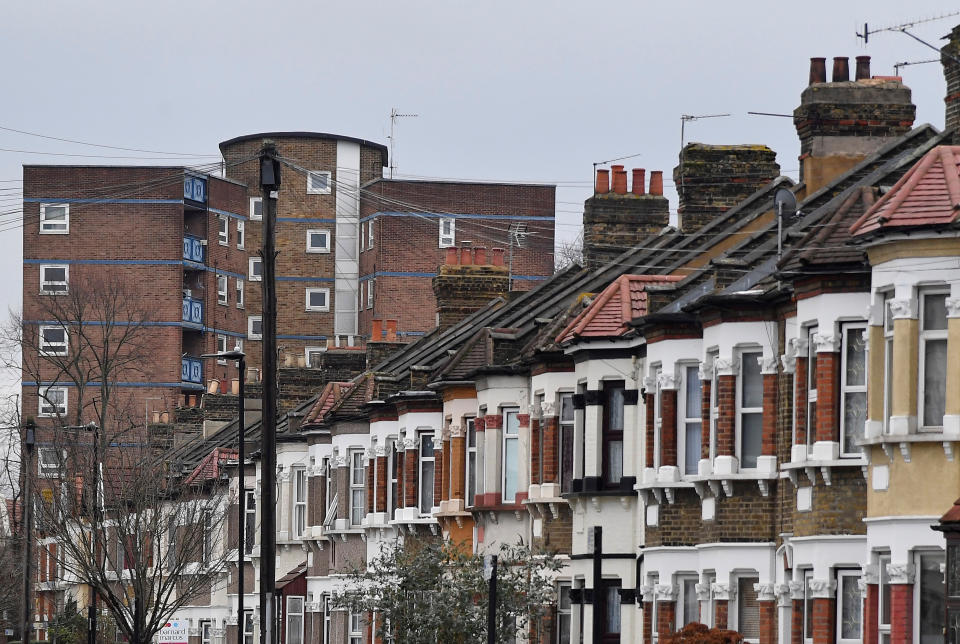Renters forced to borrow to cover deposits despite Johnson vow to help tenants

The costs of moving home could drop dramatically for private renters under UK government plans for a new ‘lifetime deposit’ announced earlier this month.
But deposits are likely to remain a major problem for some tenants despite the reforms.
The exact number of renters unable to afford deposits is not known, but a Which? survey last year suggested 43% relied on overdrafts, credit cards, loans or borrowing from family or friends.
New research published on Friday highlights the hefty costs of interest payments for those private tenants who have to borrow to cover the costs.
Polly Neate, chief executive of Shelter, told Yahoo Finance UK: “We regularly hear from those struggling to stump up the cash required, forced to borrow money from family or rely on loans and overdrafts just to secure a roof over their heads.”
Plans for a new ‘lifetime deposit’
Surveys suggest around three-quarters of the 4.5m million households renting privately in Britain have to pay a deposit of up to five weeks’ rent.
Deposits are refundable on departure if properties are left in good condition, but are often not returned before tenants have to pay further deposits on new homes.
The new Conservative administration outlined plans to tackle the issue in the Queen’s Speech earlier in December.
READ MORE: Johnston vows to hike minimum wage four times above inflation
“Millions of renters will benefit from a new lifetime deposit scheme, which will see their hard-earned deposit move with them from property to property–giving tenants more control over their lives and keeping more of their cash in their pocket,” the ministry of housing, communities and local government said in a press release.
It should allow many tenants to only raise enough cash to pay one deposit rather than two when the legislation is passed and changes come into force.
The struggle to raise a deposit

But not all tenants can cover the cost of even a single deposit on their own.
Around two-thirds of private renters say they have no savings, according to the English Housing Survey carried out by the government earlier this year.
Meanwhile official figures show UK rents have increased by 8.3% since 2015, with median rent in England reaching a record high £700 and London rents reaching £1,450 a month in the year to September 2019.
Rent rises have not only made it harder to save for a deposit, but also pushed them higher, despite a government cap at five weeks’ rent earlier this year.
Incomes have failed to keep pace with soaring property and rental price growth over the past decade, despite a recent slowdown in the property market and uptick in real wages.
“Decades of failure to build enough social homes, means that for millions of people there is no alternative to expensive private renting. And as this research shows, upfront deposits can be desperately unaffordable for many,” said Neate of Shelter.
Tenants forced to borrow to pay upfront costs
Analysis published on Friday by Ome, part of insurance firm Hamilton Fraser which runs a deposit scheme, highlights the extra burden facing tenants forced to borrow to pay deposits.
Using a credit card with a low interest rate of 6.4% would cost £44 a year in interest to pay back a typical tenant deposit of £1,299.
Tenants with average credit scores taking out personal loans at a 16.7% rate would have to fork out £163 in interest payments alone over the year.
READ MORE: The most searched-for cities for renters on Rightmove
Credit card users having to repay at a high interest rate of 36.3% would have to pay £231 back in interest over a year.
The most desperate borrowers unable to secure credit from formal lenders could even resort to payday loans despite a government crackdown, with Ome suggesting a small number could face a 292% interest rate. That would leave them paying £2,784 back in interest alone.
“Not only are tenants paying a large sum to a landlord each month, but also to their lender with the addition of interest,” said Matthew Hooker, co-founder of Ome.
“This is particularly testing for those with a poor credit score who have no choice but to borrow with some very high-interest rates.”

 Yahoo Finance
Yahoo Finance 